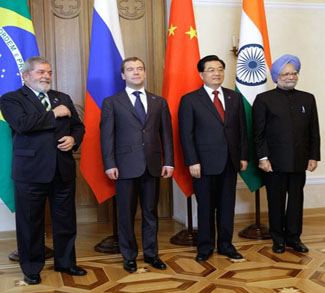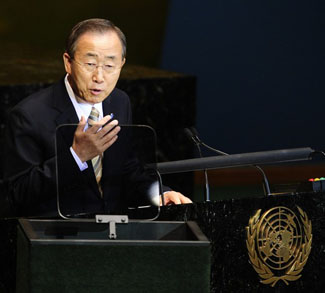FORECAST
As BRIC countries prepare for a summit in China next week, trade skirmishes and disagreements within the bloc persist in casting doubt on its future relevance as a global entity.
The BRIC label has always been one with an obvious utility attached to it. To invoke a grouping of three of the world’s most dynamic developing economies and an energy superpower in Russia is to create a theoretical counter-weight to Western power. Thus, any summit between BRIC countries has been watched with an almost rabid fascination as analysts search for any nascent indication of anti-hegemonic behaviour, and all this in spite of clearly divergent interests that exist under the BRIC label.
Some of these divergent interests are being realized in the form of economic spats, and they are looming large ahead of next week’s summit. Low-cost Chinese exports have ravaged Brazil’s shoe industry, creating a huge reservoir of animosity towards what many Brazilians feel is an undervalued yuan. This is just one of many instances where China and Brazil’s competitive advantages overlap, making them natural competitors in the global market. Tackling the value disparity between real and yuan, as well as the resulting competitiveness of cheap Chinese exports, will both be high on the Brazilian agenda next week. Here we have the potential for some spirited disagreements that may not manifest themselves in the flowery photo ops that will likely characterize the summit.
Sino-Indian relations have also been shaky as of late. In addition to long-term military animosity stemming from overlapping spheres of influence in the Indian Ocean, Delhi has also been active in fighting Chinese dumping in the Indian market. The Indian government has responded by implementing anti-dumping tariffs on a range of goods, including glass fibre, fabric, yarn, nylon tyre cord, and several kinds of chemicals.
Finally, there’s the ever-present potential for discord in Sino-Russian relations. Although China is a natural market for Russian energy exports, Beijing and Moscow have been locked in a protracted debate over just how much this energy should cost. While this will likely be resolved in the short term, their long-term strategic aspirations for East and Central Asia fundamentally clash. Far from wanting to give China a free hand to expand into and dominate these regions, Moscow will exhaust all of its options to maximize its own strategic space, including the possibility of playing the United States off against China.
Against the backdrop of all these opposing economic and military interests, without even touching down on the political ones, ‘BRIC countries’ starts to seem like somewhat of a hollow branding. It has proved its utility in the past as being a hypothetical counter-weight to American influence in international society, but countervailing interests within the bloc have always frustrated this becoming a reality. Also, as the threat of Western military power wanes over the next decade as budget constraints inevitably take their toll on defense spending, even the utility of the BRIC label as a hypothetical counter-weight may shrivel as BRIC countries begin to feel less threatened by American unilateralism.
So, once the inevitable self-congratulatory declarations start to issue forth from the BRIC countries summit next week, listen carefully and then decide for yourself whether the various delegates are trying to convince the outside world or simply themselves that the bloc continues to be a relevant force in international society.




